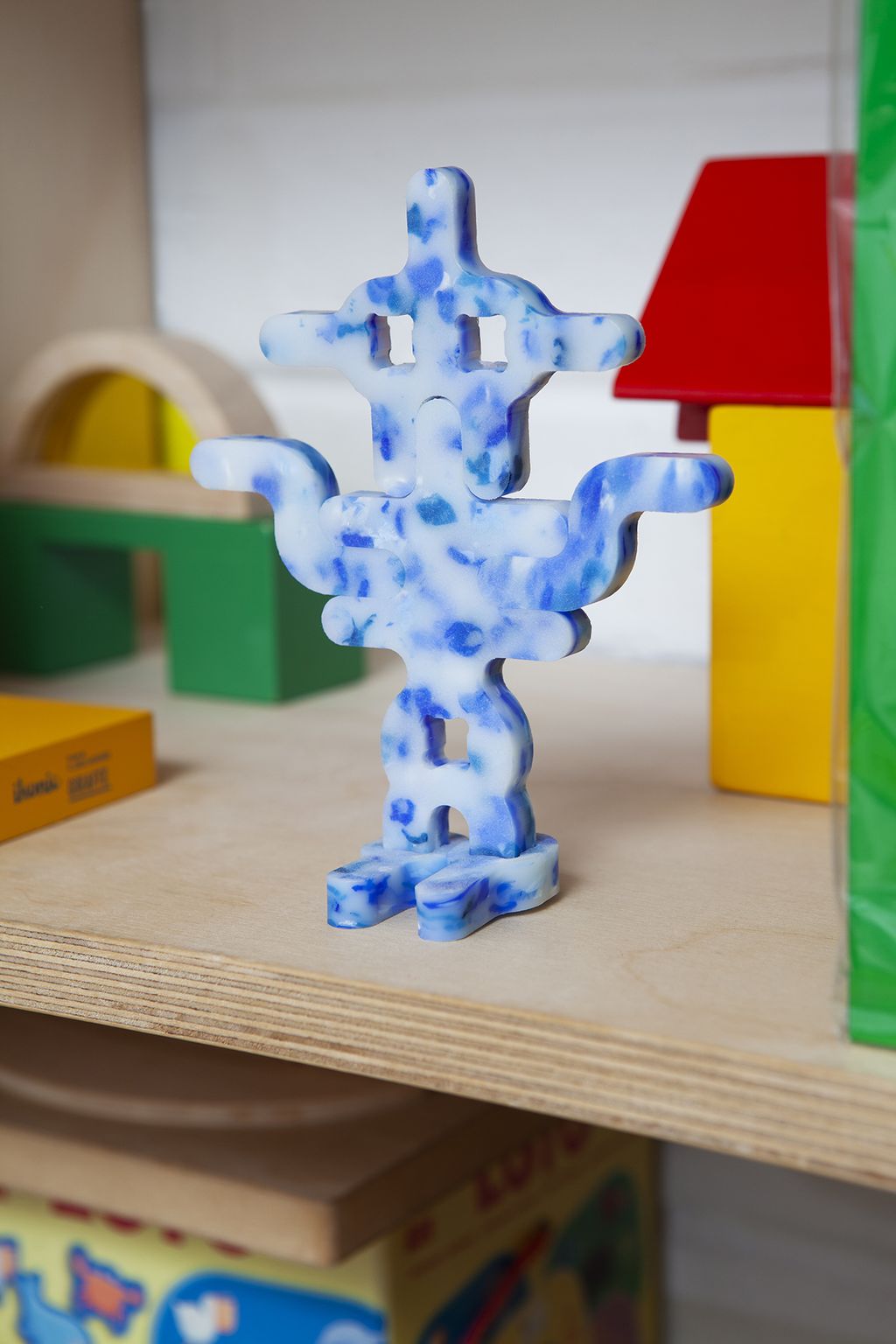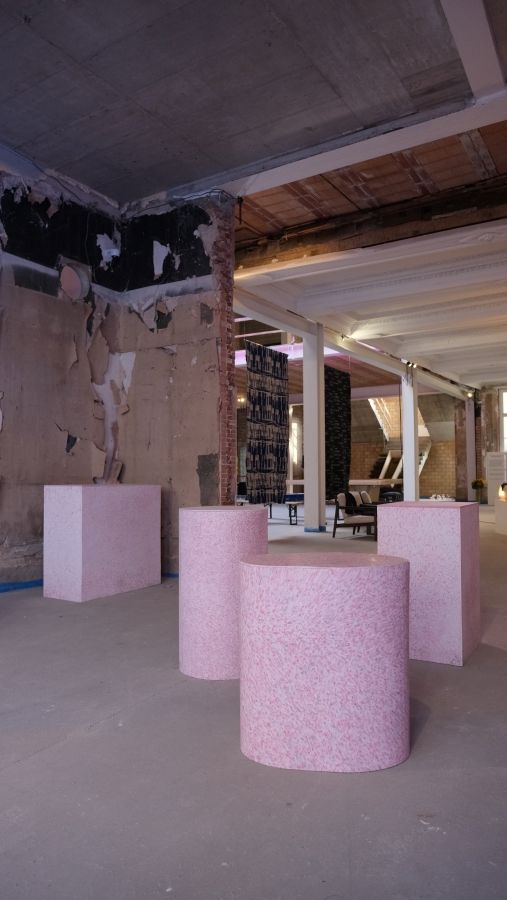
Local, recycled, sustainable and innovative: there are so many advantages to plastic as developed by Bel Albatros. Founded in 2018 by entrepreneurs Guilain Sevriere and Elisabeth Trivière the company is growing.
The sustainability and transparency of its production, as well as its commitment to social and environmental responsibility, appeal to designers such as Lionel Jadot, working with Bel Albatros to redesign the rooms of the Jam Hotel in Brussels, to creative artists (Combo Toys for children), as well as to large businesses such as Triodos Bank, and to visual artists (Jean-Baptiste Bernadet and Sammy Baloji, for a piece of work in the public space). Their product — a recycled plastic panel — brings the recycling of waste composite materials to the forefront and provides a starting point for action. Elisabeth tells us more.
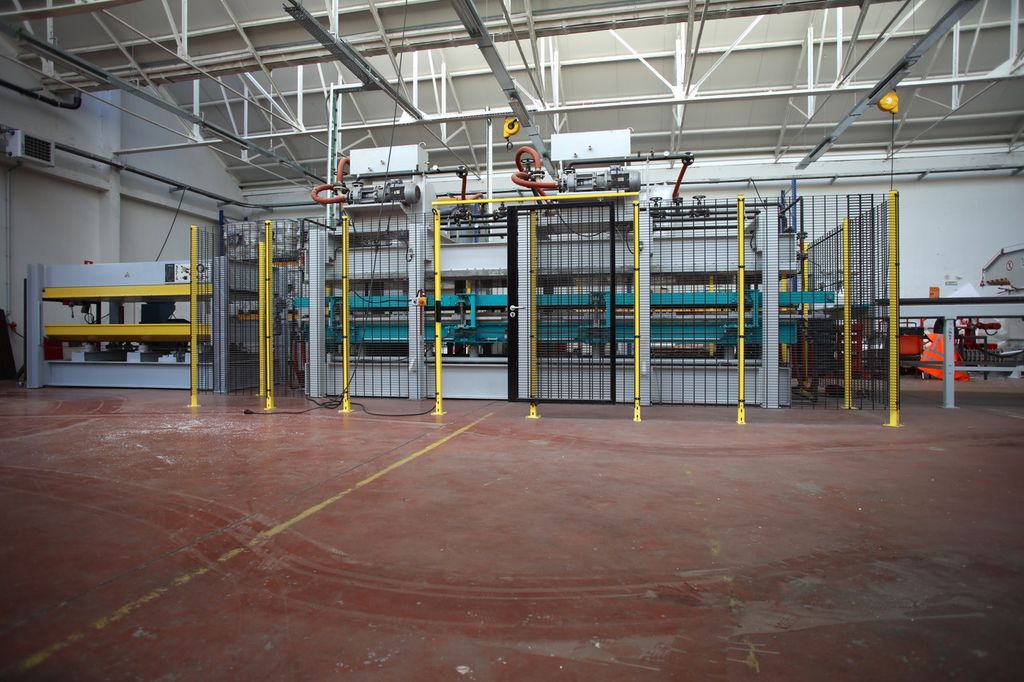
Who’s behind Bel Albatros?
The company was born out of Guilain’s idea and desire. It has a real family dynamic, both in terms of partners and employees, including two brothers on the team (although they’re not from our family). For the past two years, our team has brought together designers, an engineer and a craftsman.
Which generation do you all belong to?
Guilain is about to turn 40, I’m almost 32 and our designers are all younger, between 25 and 30.
How did Bel Albatros come about?
Guilain, who went to business school, ended up working in sales for an innovation and patenting company. A great jack-of-all-trades, he continued tinkering every weekend and began making prototypes for clients. He turned to fab labs for his projects and he became the fab manager of one of Brussels’ manufacturing workshops, Citifab 3. He then set up a fab lab with a former colleague.
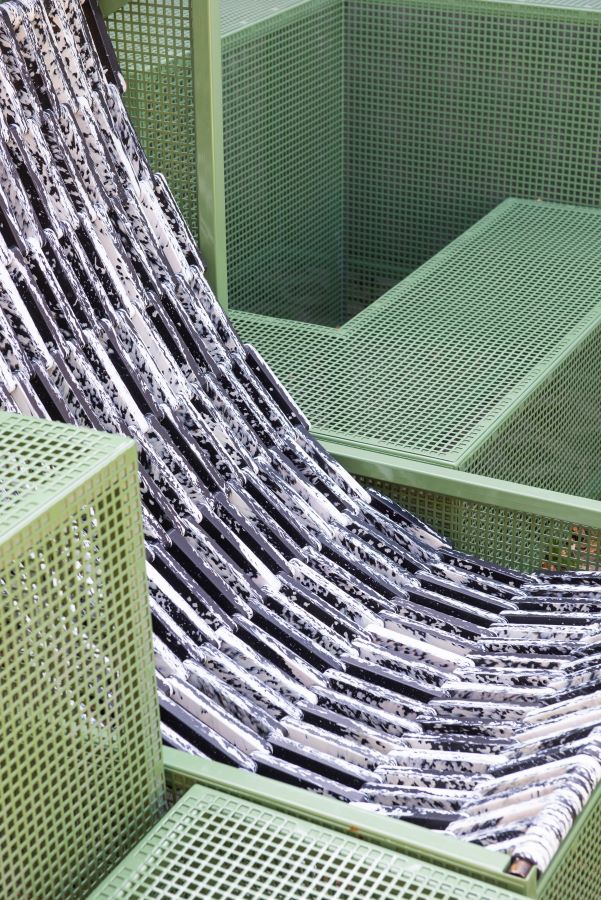
Where did your interest in plastic and giving it a second life come from?
Each fab lab usually has its own specialisation depending on the materials: wood, metal… And a few years ago, there were plastic 3D printers. We noticed that plastic was generating a lot of waste, unlike wood, which can be reused for heating, or metal, which can be easily recycled. After realising this, we worked on our first open source project, called Precious Plastic — small DIY machines that recycle plastic. Our first customer was the We Love Green Festival in Paris, for a temporary tent. We thought we could sell several recycled plastic discs made with these home-made machines, but it didn’t work out that way… We went to Belgiplast, one of the last remaining Brussels-based injectors. They agreed to using recycled plastic injected into their machines, despite the risk of destroying them. So we waited, we even slept in front of the machines, and stopped them as soon as the injection nozzle filled up! All this contributed to our story and we learnt a lot from it.
After testing this first phase — injecting recycled plastic — what challenges did you face?
The challenge is to maximise the value of recycled plastic and change the way people think about it. It’s a question of moving from seeing plastic as disposable to creating a strength out of it’s sustainability. But, although gaining a customer’s trust isn’t complicated today (they’re open-minded), an injection mould costs nearly 80,000 euros; a major financial investment… There is also the common idea that it is difficult to consider a mass-produced plastic object as durable and not disposable.
What triggered the production of recycled plastic sheets?
When discussing with our customers, we kept coming back to the same concept: making a sheet with a simple mould and being able to design three-dimensional objects from the cut-outs in this sheet. One day, an opportunity presented itself: we were able to buy our own press! So we moved our workshop to Recy-k, still in Brussels. The operation was a bit of a gamble for us… The day before the first lockdown due to COVID-19, we received our machine!
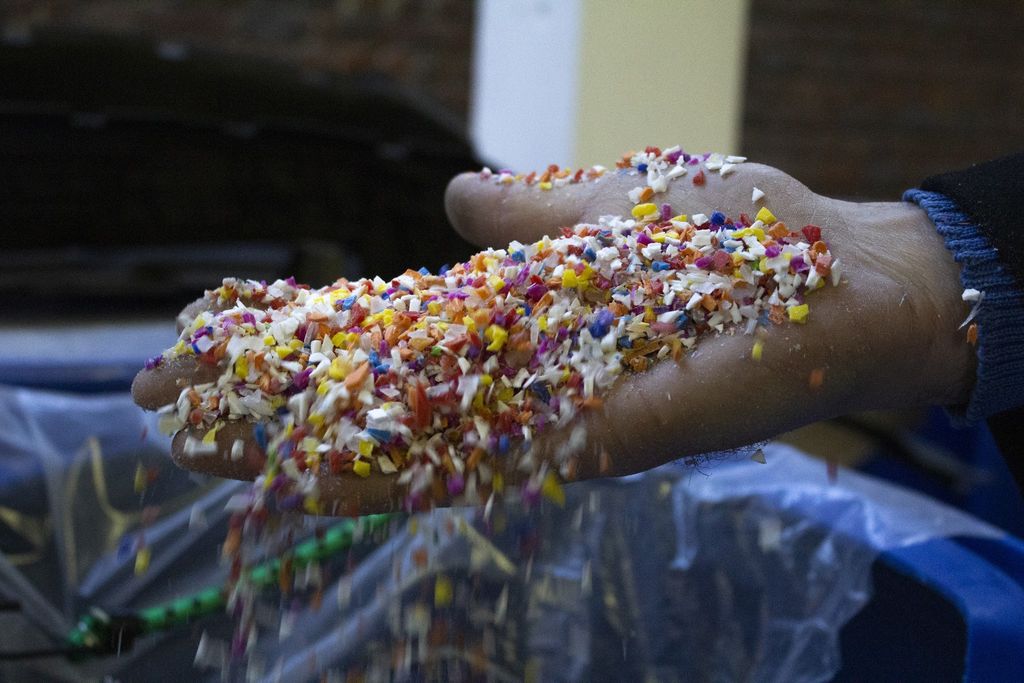
What do the sheets that you’ve been producing look like since then?
They form a new material. The sheets are attractive and colourful, and they’re used for purposes similar to what you can achieve using ceramics or marble: three-dimensional objects and volume. We started selling our first sheets very quickly, after spending some time tweaking the machines so that they were in line with our missions: to reuse, repair and recycle.
Is Bel Albatros one of a kind?
In terms of the production of recycled plastic sheets in Brussels, we’re relatively new. Our developments in plastics processing are still unprecedented. We’re still outsiders in the plastics processing industry, an industry that we’re in contact with and exchange ideas with about technical issues: as well as injection moulding, we also do compression moulding (which is rarely seen in the traditional plastics processing industry). Plastics processing is a science in itself, with the preparation and temperature of the material, its melting point, its viscosity — all parameters that are taken into account… Also, we work with an impure plastic, which means that each “batch” of our plastic changes the situation, both in terms of the final rendering of the plate and the production itself.
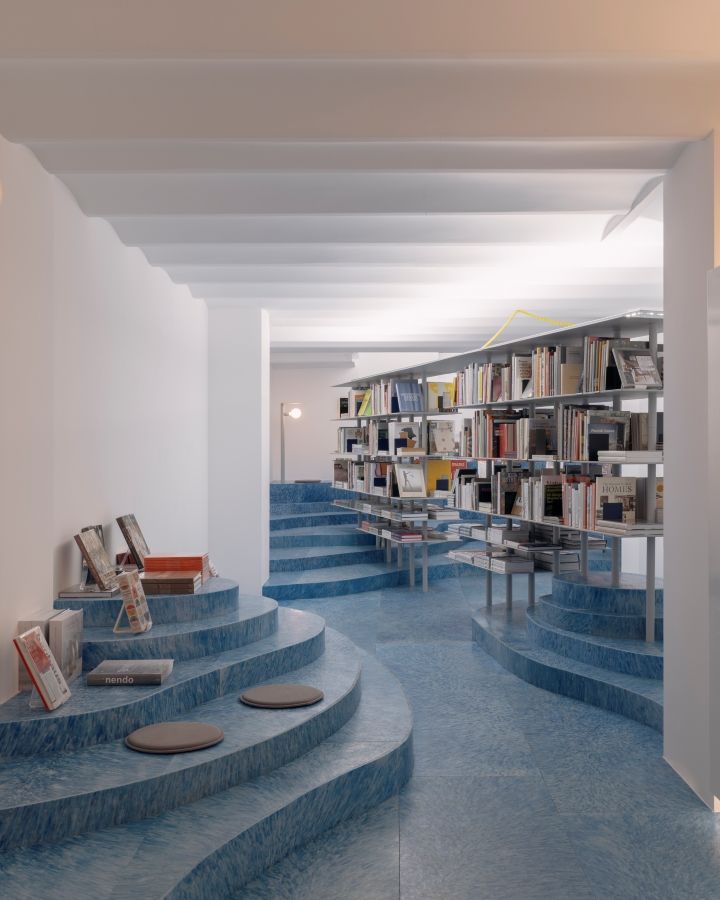
How do you position yourselves in this emerging market for environmentally responsible plastics?
We’re manufacturers first and foremost. We work for creative artists, designers, architects and companies in these sectors. We use our tool to enable them to make their ideas a reality. In Brussels, Plastic Factory makes smaller sizes and creates its own objects (soap dishes, chopping boards, etc.) which it sells to private individuals. We have a few European competitors in the production of sheets from plastic waste, such as Le Pavé in Paris. They operate on an industrial scale. We’re getting there, but step by step.
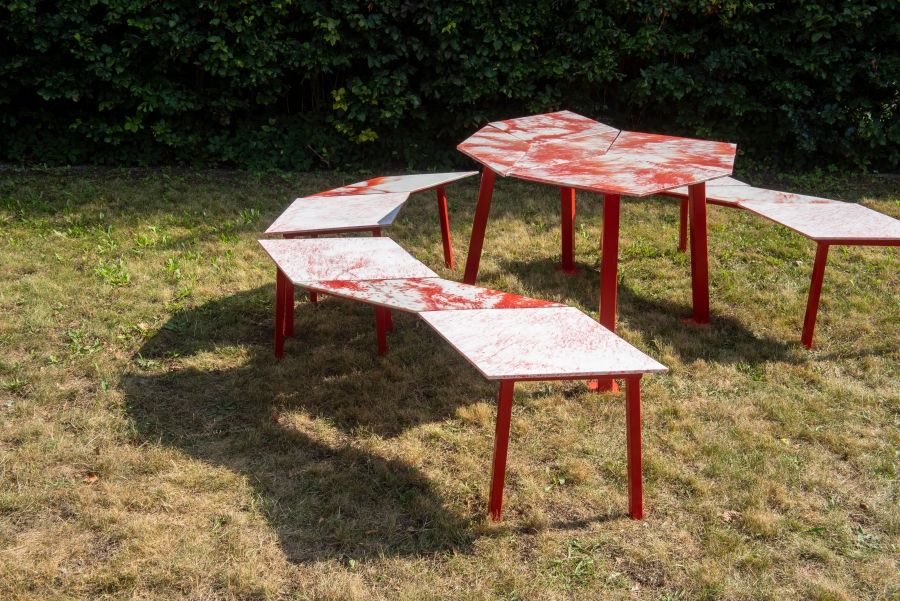
One of your specialities is the custom colouring of the sheets you offer.
Yes, as well as large polyethylene panels measuring one metre by three metres (and soon polystyrene). Our colours are selected by the customer, but sometimes new colours are generated from the chips produced when cutting the panels. We then regrind these chips to produce new sheets with our production cycle. As a result, we have been able to offer a made-to-measure range and a stock range that enable us to respond to smaller orders.
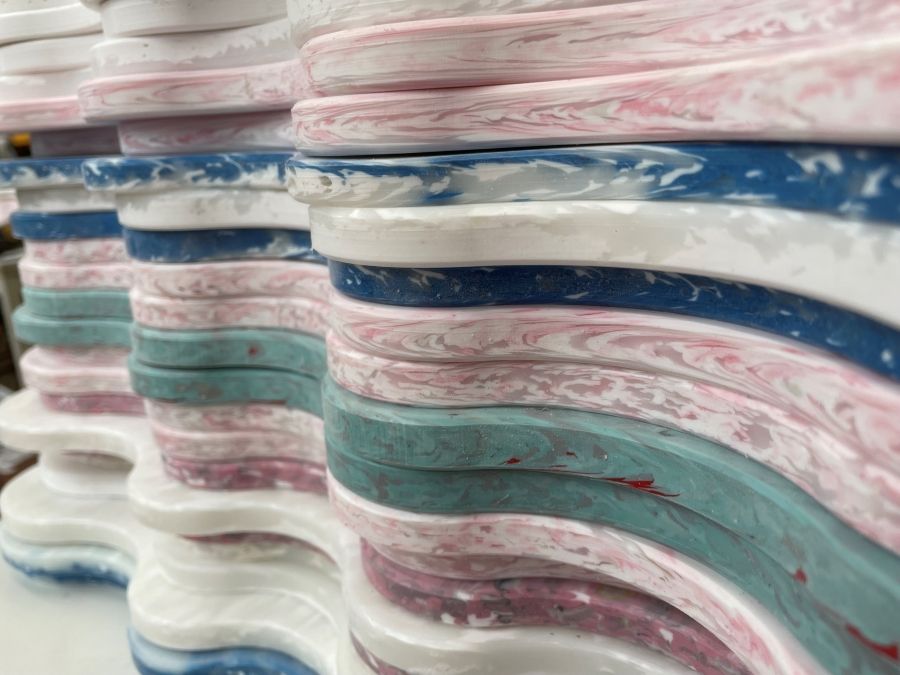
What changes in behaviour are you seeing with regard to recycled plastic?
The fire resistance is a question we’re often asked. The answer is that it reacts like wood. Over 130°C, it may leave a mark, but the material can be sanded afterwards. The appearance of recycled plastic is similar to natural stone (terrazzo or even marble), but it is soft to the touch, which is essential for many people. New generations of designers looking for eco-materials appreciate recycled plastic, because it is a responsible material that is accessible and has technical properties suited to several types of use: waterproof, acid-proof, UV-resistant, rot-resistant, can be polished, heat-formed and welded, machinable… Our plastic is the talk of the town!
